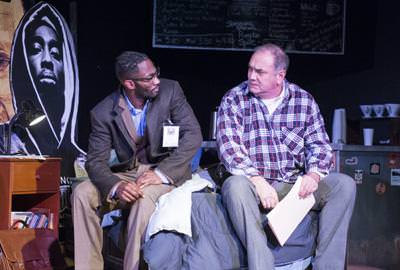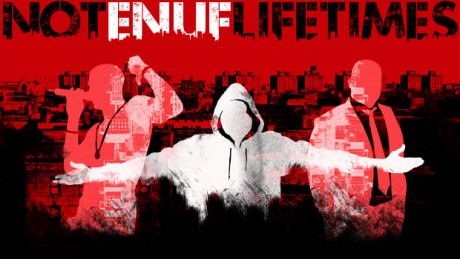There is a shortlist of great American plays about hopes and dreams, wrenching and emotionally exacting dramas exposing the anguish when righteous aspiration is tragically not enough. Arthur Miller’s Death of a Salesman is one. Lorraine Hansberry’s A Raisin in the Sun is another. Such plays endure not just because they are uncommonly well written and playable but because they take us into the heart of strivers with such specificity and universality that their stories stay in us long after we walk out of the theater and forever after illuminate how we think about life. Last night a new play opened on H Street that joins that list. Caleen Sinnette Jennings’ Not Enuf Lifetimes is, quite simply, destined to become an American classic.

Not Enuf Lifetimes is the second offering by the new DC-based Welders playwrights collective, which has been promoting the play as being about bridging the generation gap between baby boomers and hip hop culture. And that’s certainly the context of the story. But Not Enuf Lifetimes is about vastly more than that—just as Death of a Salesman is not actually about business travel; and A Raisin in the Sun, not about housing.
What Jennings has dared to do—and phenomenally succeeded at—is to put on stage the moral life crisis of a white person of conscience who is striving to do good, to make a difference in the world, someone driven by hopes of offering personal recompense for a heritage of white privilege and a dream of social justice. The authenticity of Jennings’ achievement is nothing short of breathtaking.
Jennings, a professor of theater at American University, has said the play was prompted by a conversation she once had with a “skinny, white transfer student with a head full of blond curls who had traveled all the way from the Northwest to go to school in D.C.” He was “bright and politically conscious” and he had taken a challenging job in what white folks call the inner city working with disadvantaged kids. As Jennings explains: “One afternoon, as we sat on a bench on AU’s quad, he seemed particularly sad, and I asked if he was okay. He said his social justice work was sometimes overwhelming. ‘I don’t know,’ he said, ‘It feels like there are not enough lifetimes to make up for all the bad stuff that my people have done.’”

That spark animates Jennings’ central character, Ian, who has dropped out of med school—abandoning the career his mother and father wanted for him—moved into a hood and immersed himself in hip hop and a life of radical racial- and economic-justice activism. Ian (played with wired and electrifying conviction by Kiernan McGowan) tries to explain to his working-class father, Frank (played with weary gruffness by Elliott Bales), why he feels he’s got a “deadline” for his life:
I’ve got this tiny window of time to put the world back on its axis, you know, before it spins out of control…. I’ve been reading about white privilege… racism and oppression. I’m looking for a way to live with myself….I’m trying to create something in myself to love….I’m just trying to find peace in myself and spread it around…
Or as Ian puts it more bluntly later:
I wanna do something worth shit in my life.
With Ian’s personal quest of conscience thus established, Jennings introduces us to her other characters, each of whose role in the story resonates with its own values and yearning: Majit, Ian’s girlfriend, who is of Indian descent and a social worker (played with tough empathy by Shanta Parasuraman); Cheryl, Ian’s religiously devout and superficially sweet but abusive mother (played with transfixing precision by Melissa Flaim); and two characters played by the same extraordinary actor, David Lamont Wilson: Dante, Ian and Magit’s landlord, a computer professional by day and hip hop DJ by night; and Ronnie, a hip hop poet whom Ian mentors. This double casting becomes one of the most evocative elements of the show: As Wilson conveys both Dante’s middle-class demeanor and Ronnie’s street mien, the one is unrecognizable in the other, yet both are seemingly not disparate.
Several passages in the play are spoken aloud as hip hop poetry and they are mindblowingly good. Ronnie challenges Ian’s white-privileged social-activist presumption in a scathing riff:
Where you come from?
Hopping off your white horse, Ridin’ through the ghetto to rescue, of course.
Wanna fight the power, wanna uplift all the poor
Wow, gee, I guess nobody ever tried that before
And Ian responds with a verse that is almost painfully self-aware:
I’m a white boy.
I have no rhythm.
I’m a white boy.
I have no style.
I’m a white boy
I have no way to hide
What they see when they see me
And they see beneath my skin
Jennings delves with sure clarity into both of these specific selves, one black one white, letting each speak honestly, just as she does throughout for each of her complex and compelling characters. Her writing is endlessly satisfying; each synapse of it signals some new twist, some insight, some unexpected emotional instant. And the mastery with which Jennings shapes the story of what becomes of Ian with his hopes and dreams is enthralling and touching all the way to the heartrending end.

Jennings’ fine script has been staged with great inspiration and integrity by Director Psamayene 24. Scenic Designer Ethan Sinnott has created a splendid multiplatform playing space, dressed by Scenic Artist Kelley Rowan in graffiti and urban clutter, that artfully contains both interiors and exteriors. At several points there are flashbacks that pick up from and enact an incident being told, and Lighting Designer Allan Sean Weeks fluidly shifts our visual fields to make these transitions in time and space seem perfectly seamless. Sound Designer David Lamont Wilson—playing yet another role in the show—not only makes hip hop come alive but also expands the action effectively with offstage sounds. And Costume Designer Katie Touart has dressed characters who range from street rapper to church lady such that all seem perfectly suited to tell this remarkable story.
Not Enuf Lifetimes is a play that will live on in other productions, other places, other times. This run is only the first of many to come. But that’s all the more reason to catch this Welders’ original production—the one that introduced to the theater an essential story for our time never told as powerfully onstage before.
Not Enuf Lifetimes plays through November 15, 2014 at The Welders performing at Atlas Performing Arts Center – 1333 H Street NE, in Washington, D.C. For tickets, call the box office at (202) 399-7993 ext. 2, or purchase them online.





